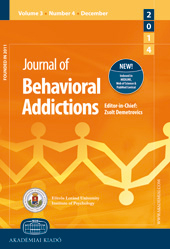Targeted Exome Sequencing for the Identification of a Protective Variant Against Internet Gaming Disorder at rs2229910 of Neurotrophic Tyrosine Kinase Receptor, Type 3 (NTRK3): A Pilot Study
Targeted Exome Sequencing for the Identification of a Protective Variant Against Internet Gaming Disorder at rs2229910 of Neurotrophic Tyrosine Kinase Receptor, Type 3 (NTRK3): A Pilot Study
Author(s): Jeong-Yu Kim, Jo-Eun Jeong, Je-Keun Rhee, Hyun Choo, Tae-Min Kim, Sam-Wook Choi, Jung-Seok Choi, Dai-Jin KimSubject(s): Experimental Pschology, Neuropsychology, Behaviorism, Substance abuse and addiction, Social Informatics
Published by: Akadémiai Kiadó
Keywords: Internet gaming disorder (IGD); targeted sequencing; exome sequencing; NTRK3;
Summary/Abstract: Internet gaming disorder (IGD) has gained recognition as a potential new diagnosis in the fifth revision of the Diagnostic and Statistical Manual of Mental Disorders, but genetic evidence supporting this disorder remains scarce. Methods: In this study, targeted exome sequencing was conducted in 30 IGD patients and 30 control subjects with a focus on genes linked to various neurotransmitters associated with substance and non-substance addictions, depression, and attention deficit hyperactivity disorder. Results: rs2229910 of neurotrophic tyrosine kinase receptor, type 3 (NTRK3) was the only single nucleotide polymorphism (SNP) that exhibited a significantly different minor allele frequency in IGD subjects compared to controls (p = .01932), suggesting that this SNP has a protective effect against IGD (odds ratio = 0.1541). The presence of this potentially protective allele was also associated with less time spent on Internet gaming and lower scores on the Young’s Internet Addiction Test and Korean Internet Addiction Proneness Scale for Adults. Conclusions: The results of this first targeted exome sequencing study of IGD subjects indicate that rs2229910 of NTRK3 is a genetic variant that is significantly related to IGD. These findings may have significant implications for future research investigating the genetics of IGD and other behavioral addictions.
Journal: Journal of Behavioral Addictions
- Issue Year: 5/2016
- Issue No: 4
- Page Range: 631-638
- Page Count: 8
- Language: English

